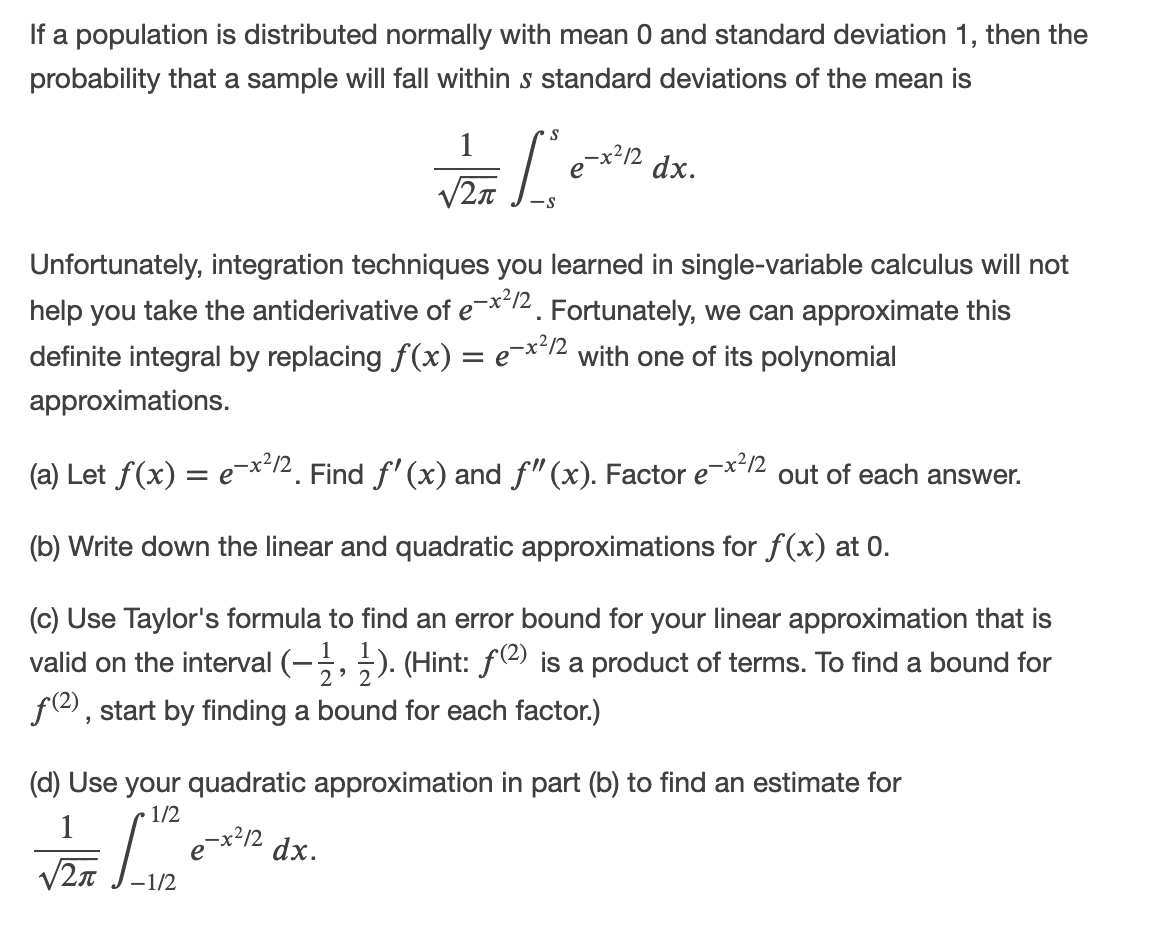If a population is distributed normally with mean 0 and standard deviation 1, then the probability that a sample will fall within s standard deviations of the mean is S 1 ,-x²/2 dx. Unfortunately, integration techniques you learned in single-variable calculus will not help you take the antiderivative of e-**12. Fortunately, we can approximate this definite integral by replacing f(x) = e-**12 with one of its polynomial approximations. (a) Let f(x) = e-x-12. Find f' (x) and f" (x). Factor e x²/2 out of each answer. (b) Write down the linear and quadratic approximations for f(x) at 0. (c) Use Taylor's formula to find an error bound for your linear approximation that is valid on the interval (-, ). (Hint: f(2) is a product of terms. To find a bound for 2? f(2), start by finding a bound for each factor.)
If a population is distributed normally with mean 0 and standard deviation 1, then the probability that a sample will fall within s standard deviations of the mean is S 1 ,-x²/2 dx. Unfortunately, integration techniques you learned in single-variable calculus will not help you take the antiderivative of e-**12. Fortunately, we can approximate this definite integral by replacing f(x) = e-**12 with one of its polynomial approximations. (a) Let f(x) = e-x-12. Find f' (x) and f" (x). Factor e x²/2 out of each answer. (b) Write down the linear and quadratic approximations for f(x) at 0. (c) Use Taylor's formula to find an error bound for your linear approximation that is valid on the interval (-, ). (Hint: f(2) is a product of terms. To find a bound for 2? f(2), start by finding a bound for each factor.)
Advanced Engineering Mathematics
10th Edition
ISBN:9780470458365
Author:Erwin Kreyszig
Publisher:Erwin Kreyszig
Chapter2: Second-order Linear Odes
Section: Chapter Questions
Problem 1RQ
Related questions
Question

Transcribed Image Text:If a population is distributed normally with mean 0 and standard deviation 1, then the
probability that a sample will fall within s standard deviations of the mean is
S
1
-x²/2
dx.
Unfortunately, integration techniques you learned in single-variable calculus will not
help you take the antiderivative of e¯*12. Fortunately, we can approximate this
definite integral by replacing f(x) = e¯**12 with one of its polynomial
approximations.
(a) Let f(x) = e¯x'12. Find f' (x) and f"(x). Factor e
-x²12
out of each answer.
(b) Write down the linear and quadratic approximations for f(x) at 0.
(c) Use Taylor's formula to find an error bound for your linear approximation that is
valid on the interval (-, ;). (Hint: f(2) is a product of terms. To find a bound for
f(2), start by finding a bound for each factor.)
2
(d) Use your quadratic approximation in part (b) to find an estimate for
1/2
1
e¯x?12
dx.
Expert Solution
This question has been solved!
Explore an expertly crafted, step-by-step solution for a thorough understanding of key concepts.
This is a popular solution!
Trending now
This is a popular solution!
Step by step
Solved in 2 steps

Knowledge Booster
Learn more about
Need a deep-dive on the concept behind this application? Look no further. Learn more about this topic, advanced-math and related others by exploring similar questions and additional content below.Recommended textbooks for you

Advanced Engineering Mathematics
Advanced Math
ISBN:
9780470458365
Author:
Erwin Kreyszig
Publisher:
Wiley, John & Sons, Incorporated

Numerical Methods for Engineers
Advanced Math
ISBN:
9780073397924
Author:
Steven C. Chapra Dr., Raymond P. Canale
Publisher:
McGraw-Hill Education

Introductory Mathematics for Engineering Applicat…
Advanced Math
ISBN:
9781118141809
Author:
Nathan Klingbeil
Publisher:
WILEY

Advanced Engineering Mathematics
Advanced Math
ISBN:
9780470458365
Author:
Erwin Kreyszig
Publisher:
Wiley, John & Sons, Incorporated

Numerical Methods for Engineers
Advanced Math
ISBN:
9780073397924
Author:
Steven C. Chapra Dr., Raymond P. Canale
Publisher:
McGraw-Hill Education

Introductory Mathematics for Engineering Applicat…
Advanced Math
ISBN:
9781118141809
Author:
Nathan Klingbeil
Publisher:
WILEY

Mathematics For Machine Technology
Advanced Math
ISBN:
9781337798310
Author:
Peterson, John.
Publisher:
Cengage Learning,

